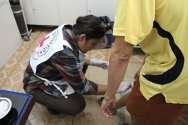Indonesia: mass scabies treatment benefits 908 detainees
12-12-2011 Feature
The ICRC has recently completed a mass scabies treatment programme at the Labuhan Deli Prison in Medan, North Sumatra, working with the Indonesian Directorate General of Corrections (DGC). The campaign benefited 908 inmates, who had been living with scabies for years.
"Scabies is a contagious skin disease caused by tiny, invisible mites," explained Wibisono Ilham, a DGC official involved in the campaign. "Symptoms include intense itching, red spots and, in severe cases, ulcers or crusting. The disease is usually transmitted by direct skin-to-skin contact or through things like bedding, clothing and towels. This means that crowded prisons are an ideal environment for the transmission of scabies,"
The scabies treatment programme at Labuhan Deli Prison involved not only the inmates but the staff as well. The first step was to steam all of the inmates' clothing and belongings for 15 minutes. While this was going on, inmates cleaned and disinfected their cells. Then they took a bath, before applying anti-scabies cream. Each inmate received a new towel and a new set of clothes, while more than 110 detainees with more severe cases of scabies received additional treatment, together with medicines.
Dr Esterina Krispurwati of the ICRC explained that this programme follows discussions between the ICRC and the DGC on capacity building in the field of environmental and general health. "After assessing prisons and detention centres all over Indonesia, a joint ICRC/DGC team realized that scabies had been a serious problem for some time, and that we needed to address it immediately. We also realized that the situation at Labuhan Deli Prison was particularly difficult," explained Dr Krispurwati.
Dr Edi Suranta of Labuhan Deli Prison acknowledged the seriousness of the situation. "Scabies tops the list of health-related complaints in the prison. This kind of effort will definitely ease our task," he said. He also expressed his hope that the programme could significantly reduce scabies at the prison, and perhaps eradicate it altogether.
"The ICRC's prison visits have been suspended since 2009, pending the signature of a new agreement with the Government of Indonesia," explains Vincent Nicod, the ICRC head of delegation in Djakarta. "Despite this, the ICRC has maintained constructive dialogue with the DGC on a range of needs and problems, especially in the field of prison hygiene and health." This is not the first time the ICRC has treated scabies in an Indonesian prison, as the organization ran a similar programme at Pondok Bambu Prison in 2008.



